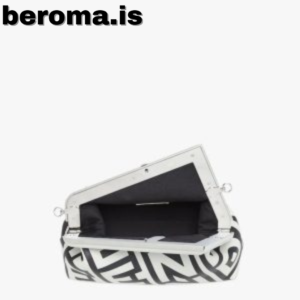 For many fashion devotees, the appeal of a luxury handbag is not merely in its functional value, but in the story it tells about the one who carries it – a narrative of taste, success, and personal style. This allure, however, often comes with a significant price tag. The Fendi Kan Bag is a statement piece renowned for its luxurious design and coveted by many. For those who are drawn to the prestige of such an item but are unable or unwilling to invest the substantial sum required, the replica market offers an alternative gateway to this exclusive world.
For many fashion devotees, the appeal of a luxury handbag is not merely in its functional value, but in the story it tells about the one who carries it – a narrative of taste, success, and personal style. This allure, however, often comes with a significant price tag. The Fendi Kan Bag is a statement piece renowned for its luxurious design and coveted by many. For those who are drawn to the prestige of such an item but are unable or unwilling to invest the substantial sum required, the replica market offers an alternative gateway to this exclusive world.
A Glimpse into Fendi’s Kan Bag and its Place in Luxury Fashion
The Fendi Kan I Bag is a love letter to Italian craftsmanship and timeless elegance. With its structured shape, signature geometrical lines, and iconic metal diagonal closure, the Kan I is a modern emblem in Fendi’s rich legacy. While the original bag exemplifies unmatched quality and design, the prohibitive cost can place it out of reach for the majority. The replica market aims to democratize fashion by offering affordable, albeit controversial, access to such symbols of affluence.
The Growing Trend of Replica Bags and Their Market
The replica industry notably thrives in the shadow of high fashion, driven by an increasing desire for luxury goods coupled with the need for more budget-conscious consumption. The market for replica designer bags has exploded over the years, with a vast online and offline presence catering to the varied tastes and preferences of consumers worldwide. This marketplace allows customers to enjoy the look and feel of luxury without the exorbitant expense.
Identifying High-Quality Fendi Kan Replica Bags: Tips and Tricks
While some may recoil at the very notion of replica bags, discerning shoppers understand that not all replicas are created equal. High-quality Fendi Kan replicas can offer an incredibly close resemblance to the original craftsmanship and materials, albeit without the designer label. Tips for identifying top-grade replicas include scrutinizing the stitching, reviewing the quality of the materials, and examining the fine details of the bag’s design.
The Ethical Debate: The Implications of Supporting the Replica Market
The replica industry is not without its controversies. It is a realm fraught with legal complexities and ethical quandaries regarding intellectual property rights. Purchasing a replica can inadvertently support an underground economy that undermines the creative and monetary investments luxury brands make in their products. This section dives into the moral implications of participation in the replica market while also acknowledging the economic factors that drive its existence.
The Consumer Perspective: Balancing Love for Fashion with Budget and Values
Consumers of replica bags often find themselves navigating a complex landscape. On one hand, they may revel in the prospect of ‘owning’ a piece from their dream collection. On the other, they might question the ethics and the potential repercussions of this decision. This section addresses the internal and external considerations consumers face, suggesting that personal values, long-term priorities, and individual circumstances should inform purchasing decisions, whether in favor of or against replicas.
Conclusion: Navigating the Replica Market with Integrity and Informed Choices
The conclusion emphasizes the importance of making informed decisions. Whether one ultimately decides to purchase a replica Fendi Kan Bag or not, it is crucial to approach the market with integrity. Understanding the nuances of replica shopping, as well as the potential impact on luxury brands, can lead to more conscientious consumer behavior.
Call to Action
Encouraging readers to continue the discussion, share their experiences, and explore the vast topic of fashion and replicas with nuanced insight. The call to action may include inviting readers to comment, visit related community forums, or share the post with others interested in the topic. Additionally, it could prompt readers to consider alternative ways to enjoy fashion, such as renting designer bags or investing in pieces from emerging sustainable luxury brands.